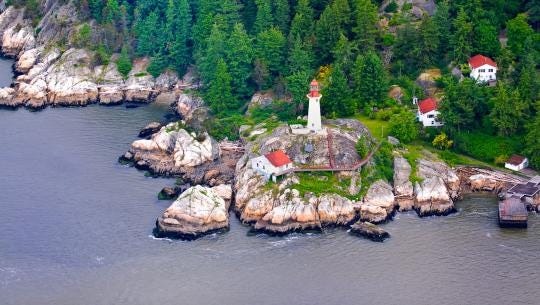Nova Scotia Over The Edge
On the brink of a coastal crisis or the verge of an environmental breakthrough
The length of Nova Scotia’s coastline is famously tricky to measure due to the "coastline paradox," where the measurement depends heavily on the scale or level of detail used. Using a general, mid-range approximation, Nova Scotia's coastline is typically estimated to be around 13,300 kilometers (or roughly 8,264 miles). This figure includes all the inlets, coves, and small islands that contribute to the province's highly indented coastal geography.
In 2011 I commissioned a production team at Arcadia to film Nova Scotia’s coastline from above and explore the stories of our coast. Since then the series CANADA OVER THE EDGE has gone on to film the entire coastline of Canada and much of the United States, and the series is seen and celebrated in countries around the world.
It was an epic and humbling undertaking that deepened my love for our woods and waters even beyond the near obsession I’ve carried since childhood.
So it’s natural that I’ve followed the twin stories of protecting and accessing Nova Scotia’s coastline as an activist.
Nova Scotia’s Coastal Protection Act in Limbo
The sea shapes us in ways we often forget. Alden Nowlan liked to recall an old Nova Scotian seafarer telling him, “The sea will never let the land be.” As Nova Scotia’s climate and political tides shift, so too do its policies on protecting that fragile ever-changing coastline.
In 2019, Nova Scotia’s Coastal Protection Act (CPA) was hailed as a landmark piece of legislation, with widespread support from all political parties. The act was meant to be a bulwark against the mounting threats of climate change, promising to shield the province’s delicate coastal ecosystems from unsustainable development. So, why has Premier Tim Houston’s government—after inheriting an unassailable mandate to push this forward—pumped the brakes?
What we’re witnessing now isn’t just the delay of a policy but the unveiling of a deeper philosophical conflict. Houston’s government is grappling with a delicate balance: empowering local decision-making while ensuring provincial oversight. And this struggle reflects broader tensions in modern governance—between central authority and local autonomy, between rapid development and sustainable protection.
Let’s dig deeper into the motivations, criticisms, and implications of this ongoing saga.
A Sea Change in Local Governance
When Tim Houston’s Progressive Conservative Party won the 2021 election, there was optimism that environmental issues would remain front and center. And they have. The conversation is loud and active. Houston's government didn’t scrap the CPA but they didn’t follow the course either; instead, they argued for shifting decision-making power to local governments. The logic? Let the communities most affected by coastal decisions shape their own policies.
Houston's government has framed this as empowering municipalities to create "local solutions for local problems." By pushing control down to municipalities, the PC government believes it’s enabling more nuanced, flexible approaches—allowing local governments to respond to specific coastal challenges. This local approach could foster a sense of ownership and responsibility among communities living on the frontlines of coastal erosion and rising seas.
However, it also leaves space for the province to step in when needed. A case in point is Owl’s Head, where citizen-led action prompted provincial intervention to stop the delisting of a crucial protected area. This flexibility, the Houston government argues, ensures that pressing local concerns are addressed while keeping the broader environmental context in mind.
Why the Delay? Public Education vs. Enforcement
One of the key reasons given for the delays in implementing the CPA has been the need for a more comprehensive public education campaign. Environment Minister Tim Halman, drawing from his background as an educator, has emphasized that without public buy-in, regulations are likely to fail. His reasoning is simple: people need to understand why they’re being asked to comply.
Halman has cited ongoing efforts to ensure Nova Scotians understand the regulations before rolling them out. This cautious approach, he argues, would lead to greater compliance and reduce enforcement challenges down the line. However, critics see this as a stalling tactic, a means of delaying real progress in the face of political or economic pressures.
Criticism from All Sides: Environmentalists Push Back
Environmental groups like the Ecology Action Centre (EAC) have not been quiet in their opposition. They see the delays as a failure of leadership, particularly given the visible impacts of climate change, such as Hurricane Fiona’s devastation. Critics argue that leaving key decisions to municipalities—many of which lack the resources or political will to stand up to developers—could result in a patchwork of weak protections across the province.
The most common concern? Inconsistency. Municipalities might have varying standards and levels of enforcement, potentially leading to unchecked development in some areas while others manage to enforce stricter coastal protections. The Halifax Examiner and The Coast have pointed to examples where development too close to shorelines has already caused long-term damage, with developers flaunting weak enforcement
“By continuing to delay the Coastal Protection Act, this government is practically inviting the ocean into our homes,” said Marla MacLeod, director of programs at the Ecology Action Centre. The EAC’s frustration reflects the broader environmentalist sentiment that any delay in coastal protection is a failure to address the very real and pressing threat of climate change.
Political Calculations: What’s Really Going On?
The Houston government is caught between two powerful currents: economic growth and environmental stewardship. Coastal property development is lucrative, and real estate in Nova Scotia, particularly along its scenic coastline, is booming. It’s no secret that powerful developers have lobbied for more freedom to build closer to the coast. The political pressure to allow coastal development is real, and Houston’s government has to manage these competing interests.
Houston has denied that developers are influencing these delays, but suspicions remain, particularly given some controversial developments, such as those highlighted by local media like The Examiner, where developers have pushed the boundaries of what’s environmentally responsible.
My Personal Point of View
Having explored most of this foreshore above and below the water I have strong feelings about all this - but they don’t quite line up with the current framing.
First, having searched for and found treasure here and around the world, I know that water deeply impacts people’s thinking far beyond what you would imagine. Put any land problem underwater and it deeply confuses people. I can only offer that the water takes us back to the womb. It is that messed up. The light glances off the surface and for most people through all of history it has been an ocean of mystery.
The sea has shaped the edges of our land world for millions of years, carving cliffs and eroding shores long before humanity laid claim to the coastlines. The old Maritimers’ adage—"the sea will never let the land be"—speaks to a profound truth, one rooted in both history and the relentless forces of nature. To imagine that we can halt or meaningfully reverse the tide of coastal change on a large scale is to misunderstand the fundamental nature of our planet. Those who believe in such grand interventions are engaging in a form of naïve hubris. They misunderstand that while we might mitigate some immediate risks with a dyke or a seawall or whatever, the idea of conquering the earth’s natural processes is a childish fantasy. And it’s fighting nature not understanding it or living with it.
To put it plainly, coastal erosion and shifting landscapes are as inevitable as time itself. They are forces we must adapt to, not battle against. Believing we can outsmart the ocean, or even slow its million-year rhythms, is fundamentally disconnected from the natural and spiritual world around us. Those who imagine we can "fix" in that human sense of the word, the problem on a grand scale reveal a fundamental ignorance of the world's natural dynamics. They fail to grasp that true progress lies in resilience and adaptation—in knowing when to move with nature, not against it. Even the most ardent conservative wouldn’t conserve so much that they wished to hold back time.
Our journey from exploring the coast from the air revealed distances, lonely lands, and diversity that could never be captured in legislation or patrolled even once in a lifetime.
No amount of oversight could guard the coast from its inhabitants, interlopers, and owners.
When we filmed Buried at Sea, a documentary about the staggering amount of unexploded ordnance and chemical weapons dumped off our coastlines after the wars, I initially believed we’d end with a rallying cry to clean it all up. But as we dove deeper, both literally and metaphorically, it became clear: the scale and complexity of the problem dwarfed any solution. The oceans are vast, the coastal expanse literally immeasurable, and the sheer quantity of toxic remnants beyond human capability to remove. All the money in the world wouldn’t begin to fix it—not without wrecking what’s left of the coastline in the process. The truth is, when we confront the monumental challenge of managing our coasts, big government solutions won’t work. There are real limits to our wealth, technology, and effort and the ocean exceeds them all by orders of magnitude.
The idea of massive government oversight to manage every inch of the coast is not just impractical—it’s financially impossible. In Nova Scotia, it would consume the entire provincial budget and more many times over. Even the most well-intentioned plans quickly run aground when faced with the realities of scope. The sea is too vast, too relentless. Coastal oversight, to be meaningful, would require a level of investment that no provincial government could ever afford. And even then, it would be like trying to control a force of nature with red tape. Just as we realized with the unexploded ordnance in Buried at Sea, some problems aren’t meant to be solved on such a large scale. The best we can do is adapt, mitigate where possible, and respect the enormity of what we’re up against.
There is only one thing in history that has ever helped humans cope with problems like this - education.
Even at the human level, there’s a reason our coasts have been havens for pirates, rumrunners, drug runners, and even sadly much of what is wrong with our modern fishery. They, like all similar coasts, are near impossible to police. People are going to do what they are going to do on the water to a large degree.
Cultural Passwords more than more than Actionable Ideas
The notion of climate change, especially in the context of coastal protection legislation, can easily function as a shibboleth in political and social discourse. In this sense, the Coastal Protection Act itself—and the rhetoric around it—acts as a marker, dividing groups into those who align with certain environmental and policy positions and those who do not.
For many, supporting sweeping climate legislation has become a shibboleth that signals alignment with progressive values or scientific consensus on climate action. Advocacy for provincial-level intervention, like the Coastal Protection Act, becomes a kind of ideological password, marking one's place within the group that acknowledges the urgency of climate change and seeks proactive measures. On the other hand, skepticism or opposition to such legislation often places individuals or groups on the outside of that particular ideological spectrum, potentially labeled as ignorant or dismissive of environmental concerns.
However, using climate action measures like the Coastal Protection Act as a shibboleth also risks oversimplifying the complexity of these issues. Those "railing to enact" coastal protections might see opposition as willful ignorance, when in fact, the hesitation could stem from a nuanced understanding of economic constraints, logistical challenges, or differing views on the most effective strategies. The problem is further compounded when "climate shibboleths" overshadow meaningful dialogue, where adherence to or rejection of certain climate policies serves more as a social signal than a genuine discussion of solutions.
In essence, the discussion around coastal protection legislation, climate change, and environmental policy can create shibboleths that simplify complex environmental and economic concerns into markers of ideological purity or exclusion. This risks alienating those who might share concern for the environment but disagree on the means of addressing it.
Let’s agree on this foundation. We all love our friends, our home, and our families. We all love Nova Scotia. We all want the good times to last. None of us set out with the intention of destroying the planet. And when that one in a thousand dummy dum dums comes along who messes things up with true stupidity, we have a solid track record of putting our hand up and expecting help stopping them.
Comparative Insights: Are We Alone in This?
What Nova Scotia is experiencing isn’t unique. California, for example, has faced similar pressures, constantly revising its coastal protection laws to balance development with environmental needs. Similarly, New Zealand has had to adjust its coastal regulations, often encountering friction between central and local governments over the extent of protections.
In both cases, delays and revisions to coastal protection laws have often been politically driven, reflecting broader debates about property rights, economic growth, and environmental urgency. Like Nova Scotia, these regions have learned the hard way that once coastal areas are developed, the damage is often irreversible.
In Maine, where similar coastal restrictions were introduced, property rights activists and coastal communities mounted a sustained campaign against the perceived overreach of government. In such cases, residents argue that they are capable of managing their land without strict regulatory oversight, and they see the laws as an unnecessary barrier to property development or personal use.
Where Does This Leave Us?
The Coastal Protection Act saga shows us that policy isn’t just about good intentions—it’s about execution. And execution, in this case, involves navigating a complex web of local interests, environmental realities, political pressures, and practical departmental budgets to direct bureaucratic effort. It’s a complex calculus of political calculation. Tim Houston’s government has made a calculated gamble, betting that giving local governments more control will lead to better, more sustainable decisions. But with environmental groups and opposition parties growing impatient, it remains to be seen whether this approach will ultimately succeed or if the government will be forced to do as governments often do - create the appearance of action for ideological reasons where none is actually possible for practical reasons.
What is clear, however, is that Nova Scotians are watching. The sea is relentless, and so too is the growing concern over climate change as a pop issue. The question now is whether the Houston government’s tide of delays will drown the CPA before it even has a chance to fail.
In-depth analysis is the lifeblood of our democracy. Subscribe to The Bee to continue the conversation. Click here to subscribe.








Excellent article
Worth reading
brass tacks: downloading to municipalities that #1, depend on tax base for $, so are very vulnerable to the seduction of shore-line development, and #2 typically aren't given back the tax $ by Provincial government necessary to hire competent, sufficient, environmentally-trained staff to carry out the work, makes the down-loading questionable.
the Conservative government speaks with forked-tongue. For instance, Tim Huston using Provincial bogus emergency measures to trump Federal DFO decision on opening the causeway on the Avon River system @ Windsor, which action deeply undermines both Environmental and Reconciliation advancement.
the idea of "balance" between development and conservation always sounds common-sensical, reasonable, but is quite often a cover for excusing really really bad irreversible behaviour.